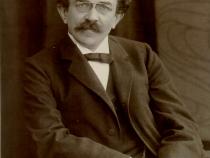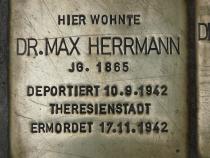Location
Augsburger Str. 42
District
Charlottenburg
Stone was laid
17 November 2008
Born
14 May 1865 in Berlin
Occupation
Literatur- und Theaterwissenschaftler
Deportation
on 10 September 1942
to
Theresienstadt
Murdered
17 November 1942 im Ghetto Theresienstadt
Max Herrmann studied German and History in Freiburg, Göttingen and Berlin, gaining a PhD in 1889. After qualifying as a professor, he began lecturing at the Friedrich Wilhelms University Berlin in 1891 but was not appointed associate professor until 1913 or full professor until 1930, partly on account of his Jewish background. In 1923 he set up the Berlin theatre studies institute, which he co-directed with German studies scholar Julius Petersen. The institute went on to gain international renown. Today, Max Herrmann is known primarily for founding the academic field of theatre studies as well as for his work in literary history.
In 1898, he married Helene Schlesinger, who gained a doctorate in 1904. Helene and Max Herrmann were active members of Berlin’s academic circles, fostering links with many associates in German studies, theatre and teaching as well as students (including Meta Corssen, Lotte Labus, Bruno T. Satori-Neumann and Franz Mirauer) and the lyric poets Nelly Sachs and Vera Lachmann.
Max Herrmann was one of the few German academics to protest against the book burning in 1933. In September that year he was forced to retire on a reduced pension under the Law for the Restoration of the Professional Civil Service. Max and Helene Herrmann had to give up the large apartment at Augsburger Strasse 34 (now number 42) in Berlin-Charlottenburg which had been their home for three decades and sell their private library. After living in smaller rented accommodation in Zinnow Weg in Berlin-Zehlendorf for some years, they moved in with Helene Herrmann’s sister, Katharina (‘Käthe’) Finder, in Eislebener Strasse 9, Berlin-Charlottenburg in 1939. Family and friends tried to find a way to enable the Herrmanns and Käthe Finder to emigrate to the USA, Switzerland or Britain. But apparently they would only go together, which was almost impossible to organize by 1939. After informing them of their imminent deportation in early September 1942, the Nazi state robbed them of their last possessions. Papers held by the Berlin superior finance directorate included the ‘statements of assets’ by Käthe Finder, Helene and Max Herrmann, in which they were required to list their family members, place of residence, financial assets etc. On 8 September 1942, Käthe Finder and Helene and Max Herrmann were taken to the so-called ‘reception camp’ in Berlin-Mitte, where they were told that their property had been seized. Two days later, Käthe Finder and Helene and Max Herrmann were deported to Theresienstadt ghetto in the ‘61st old people’s transport’. Here, Max Herrmann died, as far as is known, in the night of the 16th–17th November 1942.
An inscription on his parents’ grave in the Jewish cemetery in Berlin-Weissensee commemorates Max and Helene Herrmann. In 1979 the East Berlin state library instituted a Max Herrmann Prize, which it awarded until 1991. In 2000, the ‘friends of the state library’ began awarding the prize again.
In 1898, he married Helene Schlesinger, who gained a doctorate in 1904. Helene and Max Herrmann were active members of Berlin’s academic circles, fostering links with many associates in German studies, theatre and teaching as well as students (including Meta Corssen, Lotte Labus, Bruno T. Satori-Neumann and Franz Mirauer) and the lyric poets Nelly Sachs and Vera Lachmann.
Max Herrmann was one of the few German academics to protest against the book burning in 1933. In September that year he was forced to retire on a reduced pension under the Law for the Restoration of the Professional Civil Service. Max and Helene Herrmann had to give up the large apartment at Augsburger Strasse 34 (now number 42) in Berlin-Charlottenburg which had been their home for three decades and sell their private library. After living in smaller rented accommodation in Zinnow Weg in Berlin-Zehlendorf for some years, they moved in with Helene Herrmann’s sister, Katharina (‘Käthe’) Finder, in Eislebener Strasse 9, Berlin-Charlottenburg in 1939. Family and friends tried to find a way to enable the Herrmanns and Käthe Finder to emigrate to the USA, Switzerland or Britain. But apparently they would only go together, which was almost impossible to organize by 1939. After informing them of their imminent deportation in early September 1942, the Nazi state robbed them of their last possessions. Papers held by the Berlin superior finance directorate included the ‘statements of assets’ by Käthe Finder, Helene and Max Herrmann, in which they were required to list their family members, place of residence, financial assets etc. On 8 September 1942, Käthe Finder and Helene and Max Herrmann were taken to the so-called ‘reception camp’ in Berlin-Mitte, where they were told that their property had been seized. Two days later, Käthe Finder and Helene and Max Herrmann were deported to Theresienstadt ghetto in the ‘61st old people’s transport’. Here, Max Herrmann died, as far as is known, in the night of the 16th–17th November 1942.
An inscription on his parents’ grave in the Jewish cemetery in Berlin-Weissensee commemorates Max and Helene Herrmann. In 1979 the East Berlin state library instituted a Max Herrmann Prize, which it awarded until 1991. In 2000, the ‘friends of the state library’ began awarding the prize again.




